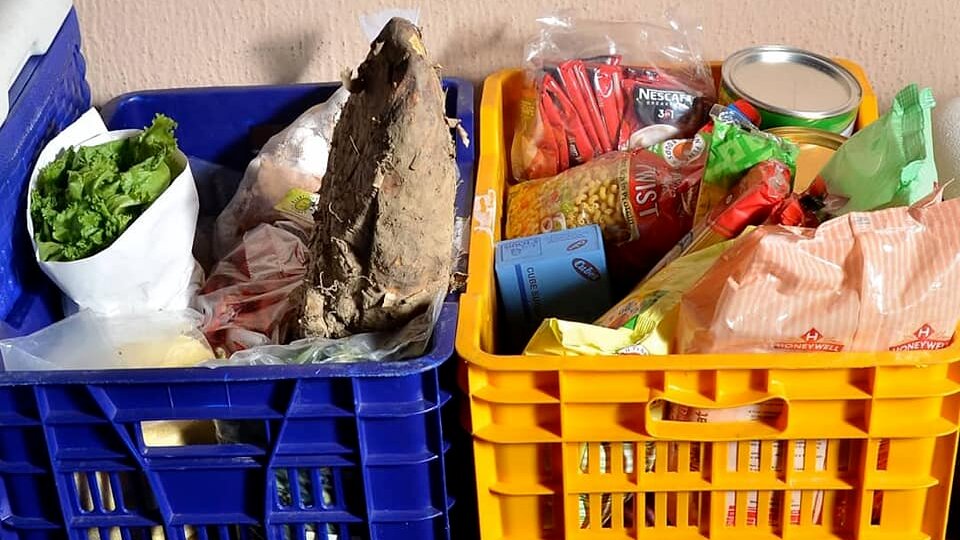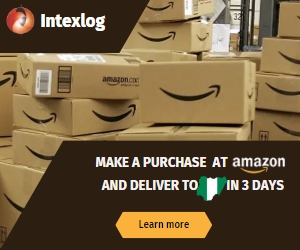Saudat Salami is the founder and Chief Executive Officer, Easyshop Easycook, a foremost multi-platform fresh grocery delivery company in Nigeria that uses technology to provide domestic support services to working professionals. Through her work with Easyshop Easycook, Saudat has been involved in driving different developmental policies and strategies in agricultural ecosystem, gender equality and women development with governments, private institutions and different organizations. With her strong doggedness and commitment to driving positive changes for women’s growth, wealth creation, job creation and development in Africa, her initiative, Personal Home Shopping Business (PHSB) has trained, mentored and empowered many stay-at-home-mums to set-up home businesses in the food delivery sector and also using the platform to provide support services for working women that seek to balance career and domestic life. During the COVID lockdown, LM’s Editor, Nkanu Egbe caught up with her and they had a thoroughly enriching conversation.
It’s such a pleasure meeting you.
Thank you so much.
How would you describe your business? Is it a logistics business or what would you call it?
I describe it as a support service.
Okay, what industry do you support?
I support working professionals.
Okay. And the way that you have made it, it is like you bring farm produce to the professionals who may be too tied up to go to the market to get these things. How did this idea come to you? When did it all start?
About a few years ago. One thing you should know is that 80% of the domestic decisions are made by women and over 50% of reason why people drop out from their careers is because of caregiving responsibilities; that is all over the world, not to talk of Nigeria or Africa, that we have the cultural responsibilities that is tied to the caregiving. When we talk about caregiving, we talk of childcare, elder care, community responsibilities and all the things in between. So, by the time I wanted to get married, I had envisaged the challenges I was going to face. I am very ambitious so I was already planning to avoid the things that could stop me in my tracks. I am a website developer so I was looking at how I can use tech to solve this issue because I was not ready to give up my job to get married and have kids. So, I looked at the caregiving responsibilities that I could use tech to solve and that I was interested in solving and I saw that shopping was one of the things. Shopping was not easy in Nigeria at the time, especially Lagos. Going to the market to look for things, the traffic was one thing, parking was another and the market was not even organized. So, you see the average woman cannot rush to the market and rush back. So, I looked at how I could build a website where working women could shop for groceries and other things and not have to leave their work or cut their careers short because they are married. In the last Mackenzie report, over 48% of the workforce are women. By the time they get to the management level, they drop to 22% and board 5%. Why? It is not because they don’t like us. I keep saying this, but at that time, we start getting married and have to choose and the average Nigerian woman will choose home. You know that Nigeria has the highest number of female entrepreneurs in the whole world but we have the smallest businesses, why, because we dropped out to start smaller businesses. So those were the things that I looked at before setting up my business, not that it is a tech company or food supply company but a support service to working women.

So, from the supply chain, how do you go from producer to consumer? How have you been able to manage between the producers and consumers and how do you do that at competitive prices?
When I started, I thought I was just going to build a website, you know, create a platform for this to work but I found out that as an online grocery delivery company, you are at the top of the value chain of agriculture and you and I know that the agricultural sector has hardly any infrastructure. The business I was doing was basically moving farm produce, vegetables, spices… The waste is crazy. So, the main market is Mile 12. I actually thought I would go to Mile 12 and bring these things in but by the time I bring them in, half of them are rotten, food waste. So, I thought I should go to the farm directly to avoid food waste. Going to the farm, I found out that the food waste is coming from the farm. Our problem is multifaceted. So for me, when I started my company, I had done a research for my target audience to know if they needed this service and if they had a problem that this service can solve and also if I have a sizable addressable market to work with for profits in running the business but the thing is you can invent outside of the people you’re trying to solve problems for; you can’t invent faster. We were dealing with people that culturally, outsourcing shopping to me and my company made them look like they were lazy. Secondly, the food they were bringing to me, if I scale on it I will be scaling waste. So our growth had to be controlled. I had to join some agric communities and some processors. You know, adulteration comes from the middle men, when you talk of palm oil, spices, it comes from the middle men. They will get the products from the farm and take them for processing and because of all the costs, they will adulterate the products to make more profit. I just realized we have a lot of work to do ourselves and this is not about supplying one million people. For the service I was doing, I was always driven by the fact that everything I was doing was to make shopping easier for the average woman. It’s not just about giving you pepper but giving you pepper that is washed and cleaned so when you come back from the office, it’s easy for you to cook. It’s about providing a service for you so that the care responsibilities that you have, you know the average Nigerian woman is not just shopping for her house, she is shopping for her in-laws house and giving her pastor food at the end of the month, there are other people she could be shopping for every month. We needed to out those services in place and we had to make her look good because there’s a lot of waste in the system and I can’t give my customers those kinds of excuses. So, in my office, we are prepping, we are cleaning, we are repacking, some of the things we are processing ourselves so that I can assure our customer the quality of what is inside. So, for us, profitability wasn’t about volume because if it was volume, we would have grown so fast. The value chain infrastructure is not available and technology that is available now and the investment that is available is only for software.
So, how were you able to brace these challenges?
It was knowing my customers and understanding them well. I can tell you that from all our customers that started with us in 2005, over 50% are still with us. We will be 15 years this October (2020) and our customers are still with us. The thing is when I entered these markets, I had to find out that it wasn’t about food but about what that service was doing, and I realised it. That was what kept me going and the customer understands what we allow them to do. So, for me, I’m not ready to buy food at N2 and sell it at N1:50k. No, I’m here to make money and provide a service to a community that I serve. So, when we had competitions that came in and were blowing, mind you, this is a sector that has a high level of entry and exit. The total addressable market in this thing is not so big but I’m here because I understand the people that are shopping. I understand how they think. So, it’s not about blowing but about growing the market. It’s about innovating with the market, social conditioning of your customers. Look at what happened in COVID, in COVID more people don’t need to be convinced to use a grocery service. Before now, they would abuse the average woman for using a grocery service. What I had to quickly go and find the cluster of people that understand the kind of service I was providing. This is not “everybody come”. No.

Okay. So, you mentioned COVID and this is quite an experience of our time because nobody envisaged what COVID would bring. But we had COVID and we had the lockdown and we had some kind of control over the movement. So, speak to the post-lockdown situation, how have you been able to strive during this period?
Honestly, I didn’t think we were going to open. It took me two days to get everything together. We have been doing this for years and now. Let me just say the stars aligned for us. So, first thing, I had to ensure the safety of my team and recognising that we are all afraid. We had to pick up our staff from home and drop them off every day. Everything that we needed, we provided, even the PPE. This was an essential service that helped to provide food for those that were isolating but we are also important because if one person should have COVID, the whole place will close down. Also, for the fear of the COVID, we couldn’t have everybody in the office because, first of all, some of the families of the staff did not allow them to leave and, secondly, because of the distance of where they were so we were working like half strength and we had to divide our teams into two. The team that was supplying fresh groceries to homes and the team that was working on relief packs for groups and organisations because many people came together to donate money to buy relief packs to give vulnerable people. So, they were in their homes putting money together and transferring from their phones, but they needed someone to get to the market, pack the relief packs and distribute in those places. We had a lot of that, and we are still doing that for various companies. For us, we are an essential service who deliver food to the last mile. The only difference was the markets were not fully open and when we get back, we have to take a bath, change clothes… We had to sanitize all the surfaces and door handles every day. My drivers had to sleep in the office every day because they were picking the staff every morning. We had to change a lot of things, but I think because we were prepared for this, it wasn’t so difficult to assume this leadership position for us and I’m really thankful for my team. Our customers were so appreciative. We got a lot of mails from them thanking us for the effort because a lot of things were not in the market and they were so accommodating. What I am thankful for most is the relief packs team who were out there distributing food items. The thing that saddened me most was there were people who usually make money daily that would ordinarily not queue for food among the vulnerable people waiting to receive a pack. It was uplifting really.
That’s great. So, is there still room for entry in your business? You know you talked about high entry, high exit. Is there still room for competition?
Yes. We are just starting, there must be room for competition because it’s not that more people understand that it’s not about money. One of the big companies that started a few months ago just exited and they came in with almost $200,000,000. It’s not about money but what you are putting your money on and what your business model and strategy is.
What would you advise those who want to start this business? I know you started from a website, what would you advise them to do?
I already have a lot of mentees in this business. I have a foundation where I train about 50 people every year. I mentor those who are going into food business and those who are going into food delivery. For me, it’s about understanding your customer. You have to know what they are buying and why and the difference in Nigeria. Our factors are very different from the ones that Amazon is working with. Our culture is different. The infrastructure that Amazon and co are riding on, we don’t have it. If you’re bringing money in, you have to have a hardware Infrastructure, cold chain infrastructure, you need to backward integrate the farmers that is supplying us. Amazon, Big Basket, Ocado, all those companies abroad the farmers are growing directly for them. They give them seeds, the value chain, the agric practice… We don’t have that here, so we can’t expect to grow like them because they came to automate a successful structure. Their own supply chain has been working very well. They just brought in technology to automate some of the things that humans were doing. In Nigeria, the structure is not there, you have no quoting, the seeds the farmers are planting are not good, their yield is not very good, the shelf life and all, so if you scale that, you’re scaling waste. So, this is not about building an app; this is about an industry, an ecosystem. When MTN came to Nigeria, they built base stations everywhere so that there will be network connection. Without those, we would not be able to call anyone. So, we must have those hardware tech in place. Even when DSTV came, they built base stations all over the place. I know that for a fact. So, of you want to do software tech, you have to do hardware tech, forget the app.
That’s very interesting. This is about post-COVID. So, Nigeria has a great outlet, we have population, we have markets, we have all kinds of things that should stimulate innovation. Where do you think Nigeria will be in the next two years post-COVID? Or is this the new normal?
We have to assume COVID is the new normal because the government has had to put so many things in place. I mean the gaps have shown. So, if we agree COVID is the new normal, a number of things will slide in place. Now you find so many people looking at all those essential services they were looking up to during the lockdown. The essential services, some, we couldn’t meet up with. Some, we could. So, that should let the government and the private sector know that these are the sectors we need to invest in because COVID is the new normal. Then we meet to start having social conditioning programmes for people to know that it is okay for these kinds of things to be in place. So, the private sector needs to invest more in the agric sector because Nigerians spend over 59% of their salaries on food and the average income is low. So, I am hopeful that we can grow the grocery sector because it’s not just homes that we supply to, we are looking at hotels and some other corporate organizations we partner with. If you partner with Easy Shop, productivity of your staff will increase. So, I am hopeful that things will align.
Thank you so much for your time Mrs Salami and we hope that people will learn from what you do. The people are grateful for your service.
Thank you so much for having me.




